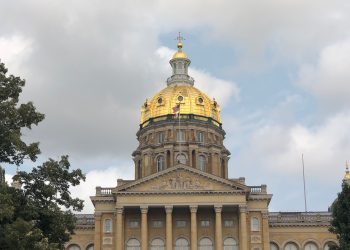DES MOINES, Iowa – The U.S. House of Representatives narrowly passed the Build Back Better Act by a 220 to 213 party-line vote. This $1.75 trillion spending bill brings sweeping changes in taxation, health care, energy, climate change, family services, education, and housing.
Contrary to those in Congress promoting the bill said, the Congressional Budget Office stated the bill would not pay for itself and would cause a “net increase in the deficit totaling $367 billion over the 2022-2031 period, not counting any additional revenue that may be generated by additional funding for tax enforcement.”
U.S. Rep. Cindy Axne, D-Iowa, is the only member of Iowa’s House delegation to vote for the bill.
“From my first day in Congress, I promised to fight to secure policies that will help middle class Iowans. And with this vote today, I’m keeping that promise by helping pass a bill that will benefit Iowa’s workers and their families, our seniors and children, and our local economies,” she said in a released statement.
“The Build Back Better Act is one of the largest middle class tax cuts in history, and invests in Iowa’s communities to create new jobs and new opportunities. It will lower prescription drug costs, make education and housing more accessible, and help you care for your family members. And we’re doing all of this while also not raising taxes on Iowa’s middle class families — rebalancing an unequal playing field that for too long has seen the largest corporations in our nation paying next to nothing in taxes while you play by the rules and fight to make ends meet,” Axne added.
U.S. Rep. Ashley Hinson, R-Iowa, blasted the bill.
“Americans can’t afford Speaker Pelosi’s radical agenda, and generations of Iowans shouldn’t have to pay for it. This legislation includes tax cuts for the ultra-rich and tax hikes on working families. It expands government control in nearly every aspect of our lives,” she said in a released statement.
“Iowans are already paying more at the grocery store, double for gas, and bracing for higher energy bills this winter–this legislation will make life even less affordable and more difficult for working families,” Hinson added.
U.S. Rep. Randy Feenstra, R-Iowa, pointed out how the bill will drastically increase the size of the federal bureaucracy.
“It is unconscionable that this massive tax and spending spree will create over 150 new government programs, including a ‘Civilian Climate Corps’ and other Green New Deal initiatives, while ignoring mandatory spending programs that are struggling. This includes Social Security, which is barreling towards insolvency. Instead, Democrats are building back broke by bankrupting future generations, adding hundreds of billions of dollars to the federal deficit,” he said in a released statement.
“In their attempt to pay for it, Democrats have proposed the largest tax hikes in American history — including a $400 billion tax hike on main street businesses and a minimum tax on American companies that will hurt both consumers and workers. Additionally, Democrats have devised schemes like hiring 87,000 new IRS agents to spy on your bank account. Weaponizing the IRS will result in dramatically higher audit rates for Americans of all income levels according to the CBO,” Feenstra argued.
“We are already seeing what reckless spending does to an economy, with inflation rising at the fastest pace in over three decades. Families across the country are paying more for gas, groceries, and to heat their homes. Higher inflation and higher taxes will deplete savings, decrease investment, and decimate economic growth,” he added. “Iowans should not have to pay the price for the most drastic and reckless expansion of the federal government in recent history, but that is exactly what will happen if this bill becomes law. That is why I voted against Democrats’ effort to Build Back Broke.”
U.S. Rep. Mariannette Miller-Meeks, R-Iowa, said lawmakers need to embrace reasonable spending and bipartisan solutions instead of passing bills like the Build Back Better Act.
“For months, the majority has ignored the ongoing crisis at our border, staggering cost of living increases, supply chain issues, empty shelves, high prices at the gas pump, and a labor shortage. Instead of working on bipartisan fixes to address these crises and support American families, the majority is pushing through a multi-trillion-dollar reckless tax and spend package that is full of tax giveaways for the wealthy at the expense of hard-working American families. The CBO has now said what we have known for months: this package is not fully paid for, doesn’t cost zero, and will increase the deficit. We must go back to responsible spending and bipartisan solutions to build a brighter future for the next generation,” she said in a released statement.
The bill expands access to affordable child care and provides universal access to preschool. In addition, the bill includes a provision that would require faith-based providers receiving federal funds to comply with federal nondiscrimination statutes, something that could compromise the mission of those organizations.
The spending bill also includes $1 billion for biofuels infrastructure, expands job training programs, and the largest-ever investment addressing climate change ($555 billion between clean energy tax credits and other climate initiatives).
It extends the expanded child tax credit ($185 billion), expands Affordable Care Act tax credits ($130 billion) provided through the American Rescue Act Plan and extends the expanded Earned Income Tax Credit ($15 billion).
The bill expands Medicare ($185 billion), allows Medicare to negotiate lower prices for prescription drugs, and provides up to four weeks of paid leave for workers or parents dealing with personal or family-related medical issues.
The reconciliation package includes a provision to increase the state and local tax (SALT) deduction cap from $10,000 to $72,500 for five years and then extend that cap through 2031. The Tax Foundation found those who would benefit most from this provision that costs $300 billion are households making between $200,000 and $1 million a year.














